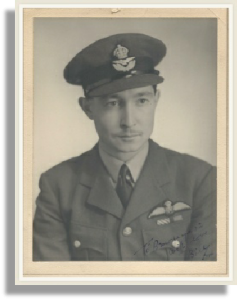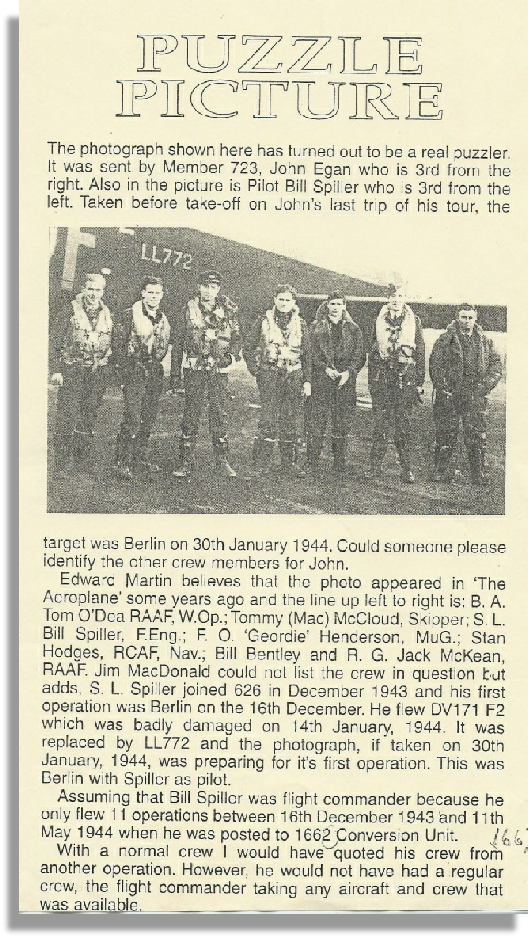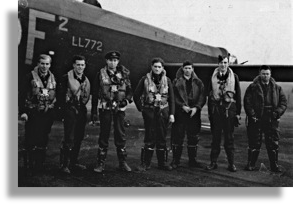This page is dedicated in honour of Josiah Lewis Spiller
Josiah Lewis Spiller
‘Here is the photo of my father. I guess it was taken towards the end of the war. It is a photograph of a young man who has survived a gruelling drawn out nightmare of a time. Although he is a survivor there is I think great sadness in his eyes’. –
During the Second World War young men came from all walks of life to give themselves up to the armed forces for the duration of hostilities. For many the desire to fly aeroplanes drove them to the Royal Air Force to join pre-
Acting Squadron Leader Josiah Lewis Spiller was just such a man. As with many of his generation, having survived the war in a most hazardous occupation – flying operations for RAF Bomber Command, ‘Bill’ Spiller resumed his pre-
The other occasion was when David and his father had been to see the film ‘The Great Escape’. They were walking back to the car in the dark and Bill said ‘You know, I knew three of those chaps who were shot. The Germans were complete b-
It was not until after his father’s death in 1986 that David found log-
Josiah Spiller had joined the RAFVR sometime in 1939 and his commission to Pilot Officer on probation from LAC rank, effective from 14th January 1940 was gazetted on 6th February of that year. He served in various bomber squadrons as an air-
Bill Spiller then went to Canada for pilot training.
Having already filled one flying log book F/O Spiller started entries in his second log in mid-
F/Lt Spiller’s next log book runs from 15th December 1941 until 7th January 1943 and the next from January 1943 to June 1945. In these two log books he flew a total 18 operations between 22nd September 1943 and 22nd March 1944.
On 29th/30th September 1943, having taken-
Date: Nov 5 1943/ Aircraft: Lancaster III ‘K’4993 / Pilot: Self / 2nd pilot,Pupil or Passenger:
F/Sgt Ives, P/O O’Dea, F/Sgt Hodges, F/Sgt McKean, Sgt McLeod/ Duty: Fighter Affiliation
(F/O Bentley was this crew’s regular navigator, not apparently required on a fighter affiliation exercise).
The crew flying with F/Lt Spiller on this occasion had previously served with 100 Squadron. In mid-
Pre-
For example, in the case of Jim Ives’s air-
Allan refused to sign his first statement –
F/Lt Spiller and his crew –
Sgt Henderson F/E
P/O O’Dea RAAF B/A (who also flew as ‘second pilot’).
Sgt McCleod Wop/ Ag
F/Sgt Hodges M/U
and F/Sgt John McKean RAAF R/G
were posted from 625 Squadron to RAF Wickenby on 5th December 1943 where F/Lt Spiller took command of newly formed 626 Squadron’s ‘A’ Flight.
‘Bill’ Spiller is mentioned in Sqn Ldr Jack Currie’s memoir ‘Lancaster Target’ At the end of his ‘tour’ with one operation left to do Currie was expecting to finish with a ‘milk run’ to a relatively ‘easy’ target and was somewhat miffed when himself and his crew appeared on the battle order for the attack on Berlin on 28th January 1944. Jack Currie intended to have it out with ‘Bill’ Spiller who suggested that it would be better to get it over with rather than ‘hanging around waiting for their last op getting more and more jittery’. Berlin was to be an early (7.00pm) take-
All went well for the Currie crew and as predicted they landed in the early hours of the morning and a crate of beer was waiting for them, courtesy of Flight Commander Sq/Ldr Spiller.
(cutting supplied by David Spiller, publication unknown).
Recourse to Squadron records confirms that the crew accompanying Sq/Ldr J L Spiller in LL772 on 30th January was predominantly his regular crew, personnel as noted in the article but with the exception of mid-
The gracious award of the Distinguished Flying Cross by His Majesty the King to Acting S/Ldr J L Spiller of 626 Squadron was gazetted on 18th April 1944.
Bill Spiller’s last day of service, as entered in his Service and Release Book was 13th November1945.
After the war Bill Spiller resumed his studies and career as a solicitor with the Lee Conservancy Catchment Board.
The River Lea, a main tributary of the Thames, was used for many hundreds of years as a transportation route, for the extraction of water for settlements along its course, for fishing and drainage. Major works to canalise the Lea were undertaken from the late 1760s and for the next hundred years or so to create the Lee Navigation which extended from Hertford to Limehouse Lock in the heart of London. In the 1930s, 130-
The Lee Conservancy Catchment Board, a separate entity from the Lee Conservancy Board, was established under the Land Drainage Act 1930 having responsibilities for various functions relating to water supply, fisheries, pollution and flood control and drainage in the catchment of the Lee Navigation. By the late 1940s Bill Spiller held the position of Clerk of the Board with significant responsibilities –
David Spiller remembers his father as ‘a very kind, quiet, academic sort of fellow’…’I never had any idea that he had been through such hell, but I am very proud of him’.



